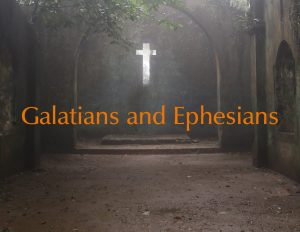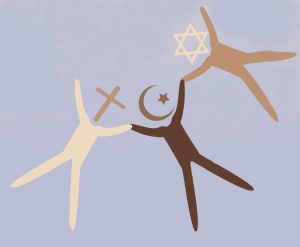Fall 2022
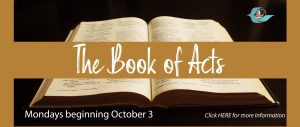 The Book of Acts
The Book of Acts
The Book of Acts stands as a bridge between the Gospels and the Letters. If it were not for the Book of Acts we will not know how the Gospel got from Jerusalem to such places as Philippi, Thessalonica, Athens, Corinth, Ephesus and other places. The Book of Acts supplies us with that information. In chapters 1–12, Luke describes the activities of Peter and in chapters 13–28 he describes the missionary activities of Paul that reach as far as Rome. In our study, we will examine the sociological, historical, and theological factors of the book as well as trace significant principles that are involved in the expansion of Christianity from Jerusalem to Rome.
Credit $660 or Audit $175
Monday Evenings 6:30-8:30 p.m.
Beginning October 3, 2022
La Canada Presbyterian Church
MEET THE TEACHER – Dr. Peter Hintzoglou
Dr. Peter Hintzoglou graduated from Barrington College with a Bachelor of Arts degree in Philosophy, summa cum laude. He received his doctorate in Pastoral Theology from Fuller Theological Seminary where he taught as an Adjunct professor for forty-two years. He served as a Senior Pastor in a number of Presbyterian churches including Silverlake Presbyterian church and Fallbrook Presbyterian Church. He has authored Greek Manual: An Inductive Approach to The Study of The New Testament. He is also serving as an Adjunct Professor of New Testament Greek and Homiletics at the International Theological Seminary. Peter lives in Pasadena with his wife Elaine and they have two children and five grandchildren.
For More Information click HERE
Previous Courses
Fall 2021
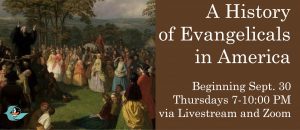 The History of Evangelicals in America
The History of Evangelicals in America
An Online Course beginning September 30
Thursdays at 7:00-10:00 pm (Pacific time)
Via Livestream and Zoom
Taught by Rev. John A. D’Elia, Ph.D
American Evangelicals are far more diverse and interesting than the troubling images we see in the media. How did a group of Bible-believing Christians become the influential political force we see today? Is that all there is to Evangelicalism in America? In this class we’ll journey through the good, the bad, and even some of the ugly as we try to understand this important religious and cultural movement.
Spring 2021
The Pentateuch: Setting the Stage for God’s Story 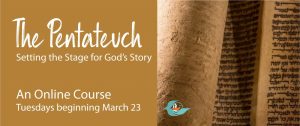
An Online Course beginning March 23 (ending May 25)
Tuesdays at 7:00 PM
Taught by Dr. Michael Woodcock
The Pentateuch – launching God’s story.
This course surveys the Old Testament books of Genesis, Exodus, Leviticus, Numbers and Deuteronomy, considering their background and seeking to grasp their main contents. We will trace key themes that hold the Pentateuch together as a whole, and how these connect with the rest of the Old Testament and the New Testament. The Pentateuch sets the stage for God’s story in scripture, and launches that story. Our aim is to appreciatre the crucial contribution of these books for the whole of scripture, and treasure their value for life and ministry today.
Celtic Spirituality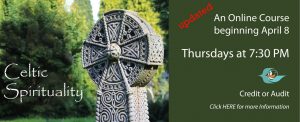
An Online Course beginning April 8 (ending June 10)
Thursdays at 7:30 PM
Taught by Dr. Rebecca Prichard
A revival of interest in Celtic art, history, and culture has led to the rebirth of a spirituality that is rooted in the sacred geography of these Celtic peoples. “New” Celts such as John Philip Newell and John O’Donohue can teach us a spirituality that is creation-centered and embodied, that nurtures connection and community, and that draws wisdom from many sources. In this ten-week course, we will consider the writings of some of these New Celts and their ancient roots in pre-Christian times and in medieval Christianity. Spiritual practices inspired by Celtic art and the worship of the Iona Community will be part of our time together. We will explore how the theology and practices of these thinkers can help congregations today to be strong and vital.
Winter 2021
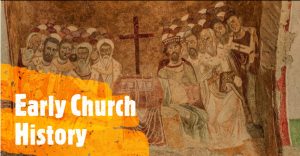
Early Church History – Beginnings to A.D. 900
Thursdays at 7:00 PM
Beginning January 28
Taught by Dr. Ross Purdy
This course will examine the development of Christianity from its context in Judaism to the formation of a well-developed organized religion (Beginnings to A.D. 900). The lectures will provide a brief introduction to the early Church, examining the difficult situation in which Christianity emerged. Students will discover the ancient church councils and creeds, the martyrs, the missionaries, and the heretics. Information will also be provided on the history of non-Chalcedonian (ancient eastern) churches. Particular attention will be given to the historical development of Christian theology in its social and political contexts.
Fall 2020
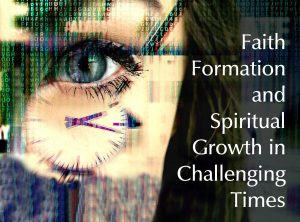
Faith Formation and Spiritual Growth in Challenging Times
Professor: Rev. Dr. Christine (Tina) Blair
The current context of a global pandemic, and the “Me Too” and “Black Lives Matter” movements, demands that we rethink our theological and educational goals as Christian educators. This context reshapes how we will think about the following questions:
What factors contribute to the growth of faith in persons? How do we nurture faith and discipleship in children, teens and adults? How is our theology lived out in our practices of nurture, education and discipleship? In what ways does cultural context affect faith formation?
We will reflect on our own practices as we explore these questions, drawing on the fields of practical theology, psychology, educational methodology and sociology, and work to create new avenues for faith formation and spiritual growth.
Student Learning Outcomes
- Students will articulate their own theory and theology of Christian education and formation.
- Students will be able to discuss different models of Christian education and formation, differentiating the differing goals, theologies and methodologies of these models.
- Students will become acquainted with current research in learning and teaching.
- Students will develop an awareness of the influence of culture and context on educational practices.
- Students will be able to describe and evaluate the whole educational curriculum of church life.
- Students will be able to evaluate curricular materials.
- Students will be able to plan an educational event.
Galatians and Ephesians
Professor: Rev. Dr. Peter Hintzoglou
This course will engage a study of these significant books by Paul covering the historical, sociological and theological issues significant in the life of the early church but also in the life of the church today. There is contrast between the two letters. The one, Galatians, is polemic in nature while the latter, Ephesians, is more irenic and encouraging and filled with thanksgiving. The issues will be examined and consider the application for ministry and life today.
Winter 2020
Theologies of Liberation
A Hybrid Course
Instructor: Dr. Rebecca Prichard
Beginning Monday, January 27, 2020
This ten-week, hybrid course will consider various theologies of liberation that have developed since the late sixties. We will consider Latin American, African, Asian, Black, Feminist, Womanist, and Mujerista theologies among others. Each of these perspectives considers Christian theology, history, and the Bible from the standpoint of those who have been oppressed by systems of dominance and conquest. We will see that traditional Euro-centric theology has been part of that domination, Christian theology is much richer and more faithful because of these voices of challenge. Because lectures and discussion will be conducted partly online, students will need access to Facebook, Powerpoint, and Dropbox. Face to face meetings to be arranged.
Fall 2019 Courses
Judaism, Christianity, Islam: Related Religious Traditions (2)
Thursdays at 6:45 P.M.
Beginning September 19
Tustin Presbyterian Church
(with streaming TBA)
Instructor: Dr. Reinhard Krauss
This course analyzes the complex interrelatedness of Judaism, Christianity, and Islam. The aim is to present these religions as living traditions whose historical origins, current interactions, and future development is the dynamic context for ministry in the multi-religious contemporary world. A dynamic slate of renowned guest scholars will present their unique grasp of the internal ethos of each of these traditions and their relationship to each other.
Introduction to Christian Theology
Online Course with several face-to-face meetings
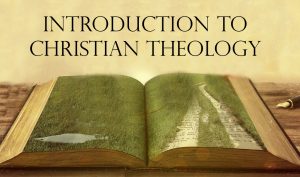 Beginning the week of September 16
Beginning the week of September 16
Students will be notified by the instructor prior to the first meeting.
Instructor: Dr. Janna Gosselin
Christian beliefs and practices are inseparable in the formation of Christian identity. One cannot be a Christian without believing in certain fundamental doctrines, yet neither can one be a Christian without participation in certain fundamental practices. In this course, we will examine the doctrines of God, Christ, the Holy Spirit, the Trinity and Humanity/Humankind while we also examine practices including Sabbath-keeping. Communion, Prayer, Praise/Gratitude and Creation care. As we examine belief and practice, we will look for the intriguing intersections between doctrine and discipline. NOTE: Weekly presentations, discussions, and assignments will be online; class participants will meet face to face at least two times (TBA).
Reformed Theology / Celtic Theology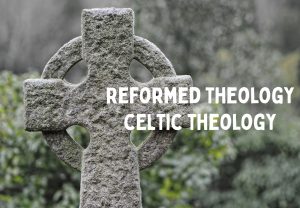
Online Course with several face-to-face meetings
Beginning the week of September 16
Students will be notified by the instructor prior to the first meeting.
Instructor: Dr. Rebecca Prichard
This hybrid course will consider the central tenets of Reformed Theology in light of recent work in Celtic history, theology, and spirituality. We will consider themes such as Revelation, Nature and Grace, Trinity, Christology, and Church through a Celtic lens. Traditional doctrinal theologians will be in dialogue with Celtic Christian writers both ancient and contemporary. NOTE: Weekly presentations, discussions, and assignments will be online; class participants will meet face to face at least two times (TBA).
The Book of John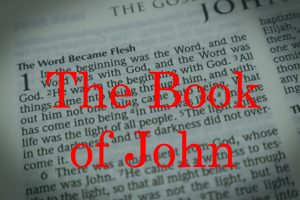
Mondays at 6:30 P.M.
Beginning September 16
La Canada Presbyterian Church
Instructor: Dr. Peter Hintzoglou
This Fall 2019 class will be a book study of the Book of John with a careful exegesis of the text. John’s gospel is unique in that it is more theological in nature and more thematic than the Synoptic Gospels. The book of John sees Jesus’ miracles as physical signs of something greater. In this class, Dr. Hintzoglou will argue that these physical signs point to a spiritual reality of what Jesus and the Father can do on the spiritual level. Dr. Hintzoglou will explicate this thesis within the context of the class.
Register Online
Fall 2019 Courses
Judaism, Christianity, Islam: Related Religious Traditions
Thursday Evenings at 6:45 P.M.
Tustin Presbyterian Church (and online streaming)
Instructor: Dr. Reinhard Krauss
Introduction to Christian Theology
An Online Course
Instructor: Dr. Janna Gosselin
Reformed Theology/Celtic Theology
Online Course
Instructor: Dr. Rebecca Prichard
The Book of John
Monday Evenings at 6:30 P.M.
La Canada Presbyterian Church
Dr. Peter Hintzoglou
Spring 2019 Courses
I Corinthians
Monday evenings at 6:30 P.M.
La Canada Presbyterian Church
Instructor: Dr. Peter Hintzoglou
Conflict Management and Resolution
Wednesday evenings at 6:30 P.M.
Glendale Presbyterian Church
Instructor: Dr. David Mc Kinley
Church History 1
Online Course with two class meetings TBA
Instructor: Dr. Rebecca Prichard
Winter 2018 Courses
THE ESSENTIAL COMPONENTS OF THE NEW TESTAMENT GREEK AND EXEGESIS:
Principles of Biblical Interpretation
Monday evenings at 6:30 P.M.
La Canada Presbyterian Church
Instructor: Dr. Peter Hintzoglou
CHRISTIAN ETHICS
Wednesday evenings at 6:30 P.M.
Glendale Presbyterian Church
Instructor: Dr. Mel Loucks
THE PROPHETS
Thursdays evenings at 6:30 P.M.
First Baptist Church of North Hollywood
Instructor: Dr. Michael Woodcock2017-2018 Courses
Seminary Course Offerings
Here you will find the full list of courses taught in the past and present at New Theological Seminary of the West.
Bible
The Whole Bible for the Whole Church Pt1
In this two quarter course, even though we begin with the Old Testament, we will continually keep in mind the whole Bible. In highlighting the themes emphasized by the authors of each book, we will examine questions of authorship, historical context, literary style, and the distinctive contribution of each writing in the salvation history leading to Jesus Christ.
Professor: Dr. Peter Hintzoglou
Christian Ethics
The purpose of this course is to study basic moral principles in a Christian perspective and their implications in Christian theology, with discussions of various ethical/moral systems and case studies in moral problems and current issues in personal and social ethics.
Instructor: Dr. Mel Loucks
The Whole Bible: Introduction to the New Testament
In this two quarter course, even though we begin with the Old Testament, we will continually keep in mind the whole Bible. In highlighting the themes emphasized by the authors of each book, we will examine questions of authorship, historical context, literary style, and the distinctive contribution of each writing in the salvation history leading to Jesus Christ.
The focus will be the historical background of the New Testament, the nature of the Gospels, and the contribution of each book to our Biblical and Theological understanding of the faith which we proclaim and practice as the church today, the Body of Christ.
Professor: Dr. Peter Hintzoglou
Introduction to the Hebrew Bible*
This course presents an overview of the First Testament/Hebrew Bible commonly known as the Old Testament with a particular emphasis on the formation of the biblical literature and the background of the culture and history of ancient Israel. Special attention will be paid to the literary structure of the biblical narrative and the social history of the biblical tradition. Implications for theological reflection and ministry will also be explored.
Professor: Jin Hee Han (NYTS)
*Hybrid Online Course with New York Theological Seminary (NYTS)
Psalms
The Old Testament Book of Psalms is perhaps the most important book of the Bible for ministry. The New Testament quotes the Psalms more than any Old Testament book. Jesus shapes his Kingdom work from the Psalms. The church’s worship and spiritual formation takes root in the Psalms. In this class we will learn (1) the content, literary features, and theological message of the Psalms, (2) the historical and cultural setting of the Book of Psalms (3) how to interpret various psalms moving from a psalm text to whole Bible context and then to our context (4) to pray and sing the Psalms for worship and spiritual growth.
Professor: Jeff McCrory Jr.
The Prophets
This course will introduce the prophetic books of the Old Testament, with attention to the prophets’ calling, message and ministry, their historical setting, and the formation of the books that bear their names. These writings occupy a crucial place within the Old Testament and in the grand sweep of scripture, as they bear witness to Israel’s “death” and “resurrection.” We will explore the essential contribution they make to our understanding of God’s freedom, justice, commitment, passion, holiness, and steadfast love. Our study will yield some fresh discoveries of the prophets’ urgent relevance for our lives and our world, including the areas of social justice, idolatry, spiritual integrity, and hope. In our class meetings we will make use of both broad survey and more detailed investigation of key passages, as well as spiritual practices, discussion and reflection. We will also participate in two outside ministry experiences that implement some key parts of the prophets’ message.
Professor: Michael Woodcock
The Book of Daniel *
In this course, we will study literary, historical and social readings of the book of Daniel. Other apocalyptic writings, including the book of Revelation, will be examined in light of sociological dynamics that are believed to shape the apocalyptic. Theological and political implications of contending interpretations of Daniel will also be explored.
Professor: Jin Hee Han (NYTS)
*Hybrid Online Course with New York Theological Seminary
The Whole Bible for the Whole Church Pt2
New Testament Greek and Exegesis
This course is designed to review the essential components of the Greek New Testament Grammar and syntax in their use for Biblical exegesis and interpretation Emphasis will be placed upon the factors of language, history, culture, context and their importance for the understanding of the text. An additional emphasis will be the practice of moving from exegesis to exposition and sermon preparation.
Professor: Peter Hintzoglou
The Gospel of Luke
The practice of our Christian life and witness depends to a large extent upon our understanding of the Gospel, the person of Christ, the function of the Holy Spirit and the spiritual practices such as prayer, forgiveness, and so on. Luke, in his Gospel, introduces us to the person and ministry of Jesus. In this seminar we will explore the mission of His ministry, the nature of salvation, and the practices designed to help believers build healthy, loving, giving relationships and be effective witnesses to the love of Jesus.
Professor: Peter Hintzoglou
The Gospel of Luke
Our immersion in the Gospel of Luke will have a dual focus. We will read the content of this Gospel with a focus on its key themes in presenting Jesus Christ as Lord of history and the Christian’s exemplar. The seminar will give attention to the political, sociological, and geographical context of the first century CE. We will also work together on how one might facilitate the learning and teaching of Luke for different audiences. Wherever you are on your journey with the Bible—you are welcome.
Professor: Madelon Maupin
Tell Me The Stor(ies) of Jesus: Looking at the Four Gospels
We have in our Bibles four Gospel stories about Jesus Christ: Matthew, Mark, Luke, and John. Anyone who has read the accounts knows that they differ in the events they present, in the order of the events, and in the characterization of Jesus himself. Yet the church over the centuries has kept the four separate stories in spite of attempts to harmonize the differences. As early as the 2 nd century a church father named Tatian attempted to pull the stories together and give us one story of Jesus. He called his story The Diatessaron, “the four through one.” The church rejected his harmonization. To this day we live with four Gospels, four stories, and one Jesus. How did we get these stories? What are they meant to tell us about Jesus and about our faith? How can we continue to read them so that the Holy Spirit speaks to us? Using symbolism (human, lion, ox, and eagle) arising in the 2 nd century, we will explore these stories and address many questions regarding Jesus and those who wrote about him.
Professor: Jeff H. McCrory, Jr.
I Corinthians for Today’s Church
In the midst of the divisions within today’s church and society, we will study Paul’s first letter to a divided Corinthian church. We will seek to understand the cultural, sociological, and religious context of the letter. We will explore the theological issues in the church in Corinth with a special emphasis for the implications for the life and ministry of the church today.
Professor: Peter Hintzoglou
Christian Tradition and Thought
Church History I: Early Christianity
The history of Christianity from the second to the sixteenth century will focus on the beliefs and practices of significant individuals, movements, and institutions. We will explore Christianity in the West (Europe and North Africa) and in the East (Eastern Mediterranean, Slavic peoples, Asia). We will ask about Christianity’s engagement with Islam before 1500. Special attention will be given to: (1) The authority and role of the Bible; (2) Early Christian missions in the Americas and Asia. In this seminar each participant’s life and faith experience is valued.
The goal is that through our immersion in Christian History we can live into a more informed participation in our respective faith communities, both locally and globally.
Professor: Jane Atkins Vasquez
Church History II: Medieval and Reformation(s)
This class will survey the important themes and people in the Western Church from the late Middle Ages through the Reformations to Pietism at approximately 1600. We will explore the environment, movements, and significant personalities in the development of the Christian Church, since it is foundational for the Christianity we experience and express today. It is hoped that this course will promote a faithful love for and personal engagement with today’s Church through developing a familiarity with the issues and practices of Christianity as it was taking shape in the Medieval and Reformation eras. Exploring our past, for both its wisdom and follies, informs how we engage Scripture, one another, and the world in the next chapter of God’s life in the world.
Professors: Gary Sattler, Jane Atkins Vasquez, Ron White
Christology and the Gospels
Protestant Mystics
Women Christian Mystics
Women Christian Mystics offers a deep and rewarding study of women who until recently were forgotten or neglected. Catholic mystics Hildegard of Bingen, Julian of Norwich, and Teresa of Avila, as well as lesser known Protestant women Anna Maria van Schurman and Lillian Stavely, write out of their feminine experience their sense of God’s presence and the practices they develop from these encounters. In each session we will engage in a spiritual practice derived from these women mystics as we seek to enrich our own understanding of and connection to God.
Professor: Dr. Janna Gosselin
The Mystical Roots of Protestantism
In this class, we will consider the forms of devotion—the “prayer techniques”—that have helped Christians over the years to develop that sense of the presence of God. Our analysis will hinge on two categories of prayer: cataphatic and apophatic prayer. We will examine the “cataphatic” approach by learning of methods of prayer expressed in Scripture, poetry and other types of “word” prayer. We will also consider the apophatic approach, which has included wordless prayer, silence and solitude to find and unite with God.
“I have abandoned all particular forms of devotion, all prayer techniques. My only prayer practice is attention. I carry on a habitual, silent, and secret conversation with God that fills me with overwhelming joy.” –Brother Lawrence
This class will examine both approaches by reading works written by or about both ancient and modern Christian prayer exemplars, including: Gregory of Nyssa, Julian of Norwich, Teresa of Avila, John of the Cross, Brother Lawrence, Jonathan Edwards, Simone Weil, and Howard Thurman. We will also read some of the more obscure experts on prayer, including the Eastern Orthodox monks who originated the Jesus Prayer and the practice of hesychasm, as well as the Western monk who composed the Meditationes Vita Christi and the Puritan authors of the Valley of Vision.
Professor: Dr. Janna Gosselin
Constructing Theology in the Local and Global Church (2)
How is theology – the “word about God” — constructed out of Holy Scripture, Christian tradition and faith experiences? In what ways does the local church context shape theological thinking? In this course, students become acquainted with classic theological thinking and contemporary theological movements. With this foundation, students focus on the theologyfound in their churches within the diversity of Southern California.
Professor: Christine Blair
Judaism, Christianity, Islam: Related Religious Traditions (2)
The course offers an analysis of the complex interrelatedness of Judaism, Christianity, and Islam. The aim is to present these religions as living traditions whose historical origins, current interactions, and future development is the dynamic context for ministry in the multi-religious world of Southern California. To acquire a grasp of the internal ethos of each of these traditions, renowned scholars and recognized leaders will be guest presenters.
Professor: Reinhard Krauss
Mission and Ministry
Certificate on Spirituality & Aging
The Spirituality and Aging Certificate program, developed in tandem with NTS West and the be.group, enables participants to gain an understanding of the essential role of spirituality and how spirituality enhances the efficacy of other health care and congregational services to and with older adults.
Programs today targeting older adults often rely upon outdated models, paradigms that do not reflect current cultural trends, or an incomplete understanding of the deeper issues faced by persons in the later stages of life. Today’s research shows that what is often lacking in older adult programming is an emphasis on the spirituality of aging.
This certificate program will focus on developing an awareness of spirituality in aging, allowing participants to engage the spirituality of the older adults whom they serve as well as their own spirituality in a manner that is wholistic and is sensitive to spiritual formation and human development.
The Certificate program provides continuing education credit for those seeking hours for:
- BRN
- RCFE
- NAB
Celtic Spirituality for Today’s Christians
A revival of interest in Celtic art, history, and culture has led to the rebirth of a spirituality that is rooted in the sacred geography of these Celtic peoples. “New” Celts such as John Philip Newell and John O’Donohue can teach us a spirituality that is creation-centered and embodied, that nurtures connection and community, and that draws wisdom from many sources.
In this course we will consider the writings of some of these New Celts and their ancient roots in pre-Christian times and in medieval Christianity. Spiritual practices inspired by Celtic art and the liturgies of the Iona Community will be part of our time together. We will explore how the theology and practices of these thinkers can help congregations today to be strong and vital. (can be taken for 1 unit or for audit)
This two-part course will be taught by the Rev. Dr. Rebecca Prichard who has lived and worked in Scotland teaching Celtic Spirituality in the US, in Scotland and New Zealand. A theologian and pastor, Rebecca was ordained in 1988 as an assistant Minister in St. Giles’ in Edinburgh and has taught at San Francisco Theological Seminary, Christian Theological Seminary, Whittier College, Chapman University, and NTSW. Rebecca is also a practicing calligrapher with a special interest in the Celtic Gospel books. As an Associate of the Iona Community, her many contacts in Scotland will enhance the pilgrimage we will make together.
Professor: Rev. Dr. Rebecca Prichard
Pray Without Ceasing
Leadership for the Church Today
This course will be an investigation of the theories, qualities, and practices of Christian leadership. It will be based on principles in Scripture and other related sources including literature and assessments. Self-reflection and assessment of leadership skills, strengths, and style, will be conducted with attention to developing a personal philosophy of spiritual and transformative leadership.
Professor: Dr. Ivan Pitts
Introduction to Christian Belief and Practice
We will examine the practice of Sabbath-keeping in the context of a four-hour retreat to a local retreat center. As we explore belief and practice, we will look for the intersections between doctrine and discipline while we seek ways to deepen our belief and shape our spiritual formation.
Christian beliefs and practices are inseparable in the formation of Christian identity. One cannot be a Christian without believing in certain basic doctrines, yet neither can one be a Christian without participation in certain essential practices. While one’s Christian beliefs inform his or her practices, one’s Christian practices not only can inform but can deepen one’s beliefs. In this course, we will examine four basic Christian doctrines—the doctrines of God, of Christ, of the Holy Spirit and of the Trinity, while we also examine five basic Christian practices: prayer, Bible-reading, communion, praise/gratitude and Sabbath-keeping.
Professor: Dr. Janna Gosselin
Counseling and Spiritual Care
The purpose of this course is to teach the fundamentals of a lay counseling ministry in the local church. These consist of an appropriate counseling methodology; a basic understanding of the kinds of problems parishioners bring into a church setting; and a clear delineation of the limits of this ministry, both morally and legally.
The latter concerns issues of referral, diagnosis, and levels of competency. For those seeking ordination, this class will also provide a thorough examination of the ministry of pastoral counseling.
Professor: Dr. Gary Ventimiglia
Reformation Weekend
Celtic Spirituality – Scotland Trip
Worship and Sacraments
Worship: The Work of the People
This course will consider the history, theology, and practice of Christian worship. An ecumenical approach will allow students of various traditions to see how they fit into the grand celebration that is the worship of our Triune God. Along with history and theology, we will plan and lead worship within our class sessions. The course will try to cover the basics of pastoral leadership and lay participation in the sacraments of baptism and eucharist and in other rites of the church such as marriage, burial, confirmation, and ordination. The role of music in worship will be part of each session.
Professor: Rev. Dr. Rebecca Prichard
Spirituality and Social Justice
“Two of the great hungers in our world today are the hunger for spirituality and the hunger for social justice. The connection between the two is one the world is waiting for.” This class aims to address that very connection. Although a meaningful spiritual life and social justice are both significant topics for the church and society today, few explore the crucial link between the two. Yet this link is where lives can be transformed. The lives of deeply religious people, on the one hand, show that, as their spiritual life deepens, a deeper interest in the welfare of others is a natural outgrowth. On the other hand, for those interested in perpetuating needed social change, a deeper spiritual life is vital to avoid burn-out. Beyond mere self-care, spirituality prompts the activist to transform his/her goals from a movement against a particular social ill to a movement toward deeper goals of hope, love and reconciliation. The leadership of Howard Thurman, Martin Luther King, and Sojourner Truth exemplified this principle. In sum, a focus on spirituality both builds and sustains movements for social justice, allowing all to work from and for God’s love.
Professors: Janna Gosselin and Charles Marks
Christian Spirituality and Suffering
Why do we suffer? If we are suffering, are we falling short? Does God use suffering? Can we draw closer to God through our suffering? What about the times when we are overwhelmed by suffering? Does God suffer with us? Although we typically think of suffering in terms of physical pain, suffering can take many forms, including emotional heartache, relational isolation, and spiritual alienation. Some believe that if we are suffering, we are failing in our Christian life. Yet, suffering is built into the very fabric of our faith through Christ’s suffering on the Cross. Tim Keller says, “Suffering is actually at the heart of the Christian story.” Christ’s suffering is redeemed in the resurrection. Is there a way that our suffering can be redeemed as well? In this class, we will read from Scripture– including Job, the Psalms, the Gospels, and Paul–as well as works by C.S. Lewis, Thomas Merton, Julian of Norwich, Teresa of Avila, John of the Cross and others as we seek to understand the role suffering plays in our lives.
Professor: Janna Gosselin
Reading the Bible for Spiritual Growth
The Bible exhorts the faithful to pursue holiness, that is, to grow spiritually. These same scriptures provide us with many tools with which to practice spiritual disciplines, that we might be more faithful and holy disciples of Jesus Christ. This course will study these tools and teach these practices. We will explore ways to enrich prayer and contemplation, to engage in lectio divina, and to foster practices of justice and peace.
Professor: Tina Blair
Faith Engaging Culture
Culture is what we make of God’s good creation because we believe culture has the imprint of God. In this class we will explore basic theological tools for Christian engagement with different forms of cultural expression, including film, music, television, dance, visual arts, and sports. Our goal will be to think theologically about the cultural expressions we enjoy, and therefore discover how they can best be used to build God’s kingdom.
A special invitation is extended to the many people in Southern California for whom the media in all its expression is their vocation.
Professor: Eric W. Dailey
Reading and Teaching the Bible in a Multicultural World
In reading the Bible, our native cultures are lenses through which we read and understand God’s Word for us. In Southern California, our congregations have members from diverse cultures. How do their cultural differences shape biblical interpretation? How do we read and teach the Bible faithfully while honoring cultural differences? In this seminar we will deepen our appreciation of the Bible and our understanding of the role of culture in shaping our reading and teaching of biblical texts. Our goal is to work together to develop strategies for finding unity amid diversity.
Professor: Christine Blair
A Spirituality for Busy People
This Practicum will examine how people with time-driven schedules, multiple commitments, and family, vocational and cultural challenges, make time in their lives for God. Students will be invited to examine the “real” world in which they live–work, study and worship–as well as their own “habits of the heart.” Working together we will identify particular ways in which our spiritual life can be nourished as we seek to live “in” Christ. Through creative class dialogue, informal community interaction, and selected readings, we will “stitch together a context” for understanding how busy people encounter and are encountered by the Holy Spirit.
Professors: Shelley Irvine and Rob Tribken
Reading and Teaching the Bible in a Multicultural World
In reading the Bible, our native cultures are lenses through which we read and understand God’s Word for us. In Southern California, our congregations have members from diverse cultures. How do their cultural differences shape biblical interpretation? How do we read and teach the Bible faithfully while honoring cultural differences? In this seminar we will deepen our appreciation of the Bible and our understanding of the role of culture in shaping our reading and teaching of biblical texts. Our goal is to work together to develop strategies for finding unity amid diversity.
Professor: Christine Blair
Faith-Rooted Organizing
Faith-Rooted Organizing (FRO) offers an alternative to standard community organizing approaches in that it is shaped and guided from the ground up by the deepest beliefs and values of the Christian faith. FRO is designed to enable Christians to contribute our unique gifts to the broader movement for justice. Since the 1930’s, organizing movements for social justice have largely been built on assumptions that are secular in origin – such as reliance on self-interest and having a common enemy as the primary motivation for change. But what if we as Christians were to shape our organizing around all the implications of the truth that God is real and Jesus is risen? This model of organizing emerges directly from our Christian conviction and helps faith leaders to lead their congregations into “whole gospel discipleship” integrating evangelism, direct services, community development and community organizing as expressions of God’s love for the world. Students gain practices and tools that help inspire the church to work for a just, equitable and sustainable world.
Professor: Alexia Salvatierra
Elements of Successful Leadership
This seminar will develop a definition of leadership that comports well with Christian values and translates into practical application. It will provide a clear understanding of the elements required for successful leadership in churches and organizations and will enable participants to develop ways to be more effective in real case situations important to them. The objectives of the seminar: to enable participants to further develop the skills of leadership and gain the confidence to exercise effective leadership.
Professor: James R. Appleton

